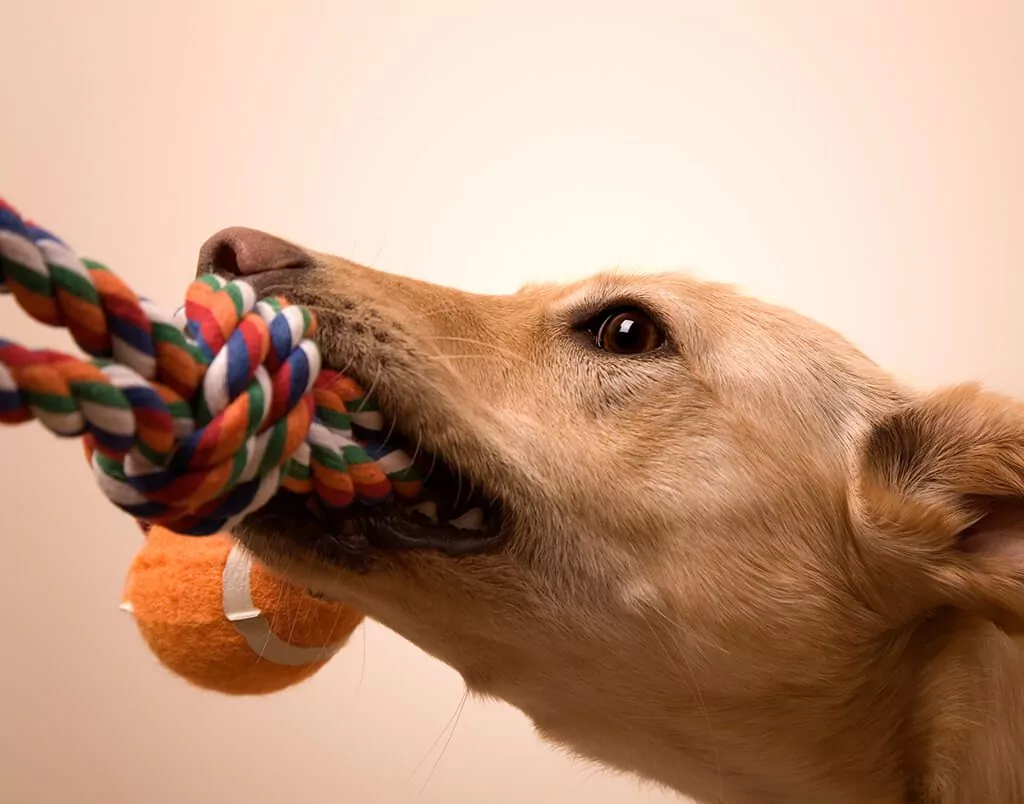As dog owners, we want to make each phase of their lives as easy and pain-free as possible. This is especially true when our puppies start teething around three weeks. And then again when, at around twelve weeks, their “milk or baby teeth” fall out and are replaced by permanent ones. By six or seven months, a puppy typically has all of its “adult teeth.”
During this entire process, owners often look to toys to relieve their beloved pups. Toys, in fact, are preferable to our hands and feet, which puppies seem all too eager to accept as playthings. And teaching them that our appendages are appropriate for them to gnaw on is dangerous for you and your entire family!
But you may be asking yourself, “What toys are the best? Which ones are safe?”
Great questions! The following information from our Holmdel, NJ, veterinarians should be helpful.

Toys to Avoid
Most veterinary dentists recommend preventing puppies from chewing “anything hard.” That can include objects made of nylon, bones, and antlers. These experts also summarize the toys to avoid as “anything that won’t bend.”
It is also recommended that you avoid giving your dog toys that resemble items around your house (like shoes) that you do not want them to chew on.
Toys that your puppy probably shouldn’t chew on include those that have:
- Long strings and ribbons
- Squeakers inside
- Foam stuffing
- Sharp angles or corners
(You should also avoid toys that are smaller than your dog’s mouth. You don’t want to run an even higher risk of your puppy swallowing and choking on it!)
Toys that are “Safe”
Although no toy can be considered 100% safe because dogs willingly choose to chew on almost anything and everything, your vet can recommend appropriate toys for your dog’s breed and size. No matter what those toys are, however, it is important that you monitor your dog while it is playing with it and make sure to stay up to date with the state the toy is in. Discard any toys that look like your puppy has thoroughly enjoyed (i.e., look past their “prime”) playing with already.
Having said all of that, chewing toys are obviously important for puppies. They sooth their aching gums and teach them what is and what is not appropriate for them to play with.

Rope Toys
Before offering these toys to your dog, make sure they are made with high-quality rope. Cheaply made products break easier, and your dog may be able to pull off and digest the fibers.
(The standard of quality should really be considered for all toys. Top-quality products are safer for your pet and will last longer [more bang for your buck!]).
Durable Rubber
This is the most popular toy for a teething dog, but you want to ensure that it is just the right consistency—hard but not too hard.
A simple test to determine this is called the “fingernail test.” Simply put, a toy passes this test if you can leave an indent in it with your fingernail.
Frozen Chew Toys and Teething Treats
Some toys are designed to be frozen, and they can help relieve your dog’s gum pain and reduce gum swelling. You can also find food-friendly toys that can be stuffed with treats and then frozen.
There are other special treats that are specifically crafted for teething puppies.
(If you’re on a budget, you may consider tying a wet washcloth in a knot and then leaving it in the freezer or substituting ice cubes*).
Some specific toys that may be safe for teething puppies include:
- KONG Puppy Toy (voted best overall)
- Nylabone Puppy Chew (voted most affordable)
- Apasiri Chew for Aggressive Chewers (voted most durable)
- Nylabone Puppy Starter Kit (voted best multi-toy pack)
- Benebone Wishbone (voted best flavored)
- CHIWAVA Standing Stick Animal Chews (voted cutest/silliest)
- Benebone Zaggler (voted best interactive)
- Nylabone Chill & Chew Puppy (voted most soothing for gums/teeth)
- Petstages Mini Bone Tug (voted best multi-purpose)
- ZHEBU Dog Chew (voted best for cleaning)
- Nylabone Wishbone Chew (voted easiest to chew)
Other Recommendations for Teething Puppies
It’s a good idea to get your puppy used to having something in its mouth other than a toy or food. This can be accomplished by brushing your dog’s teeth. Not only is this a healthy and helpful practice in terms of hygiene (dental problems are among the most common ailments for dogs), but it also aids you in retrieving objects from your dog’s mouth without the risk of a nasty bite to the hand. Ask your vet for suggestions on appropriate brushes and toothpaste (do not use products made for humans!) and request a demonstration of the proper technique for brushing your dog’s teeth.
Also, it’s important not to force your dog to become comfortable with this routine. Allow them to be curious and playful at first—let them familiarize themselves with the objects before you shove them into their mouths.
Will My Dog Stop the Need to Chew?
Short answer? No, not entirely. Chewing, biting, licking, etc., are all normal ways for your dog to live, learn, and acclimate to their environments. However, the intensity of these behaviors can lessen around 18 months. If they remain “excessive or aggressive,” you should consult your veterinarian for behavioral advice.
Ask Our Holmdel, NJ, Vets if You Need More Info About the Best Puppy Teething Toys
While no toy can be considered completely safe, with consideration of your dog’s breed and size, along with guidance from your vet, you can find toys that are suitable for your dog’s needs, from puppyhood and beyond! It’s important to find these because you need to teach them what is appropriate to play with (not your and your family’s fingers!).
But remember, your attentive monitoring is also integral in ensuring your dog’s safety when it plays with a toy. Throw any away that appear to be on their last leg to keep your dog from biting small pieces off and ingesting them (both of which severely danger your pet’s health, and the care of which will likely result in a hefty vet bill).
If you have any additional questions or need more information about the best puppy teething toys, and what our Holmdel, NJ, vets recommend, let us know during your puppy’s exam. To schedule an appointment, give our animal hospital a call at (732) 671-3110.
*- Some professionals caution against allowing your puppy to chew on ice cubes—if you’re wondering, it’s probably a good idea to check with your local veterinarian to find out what is best for your dog!
